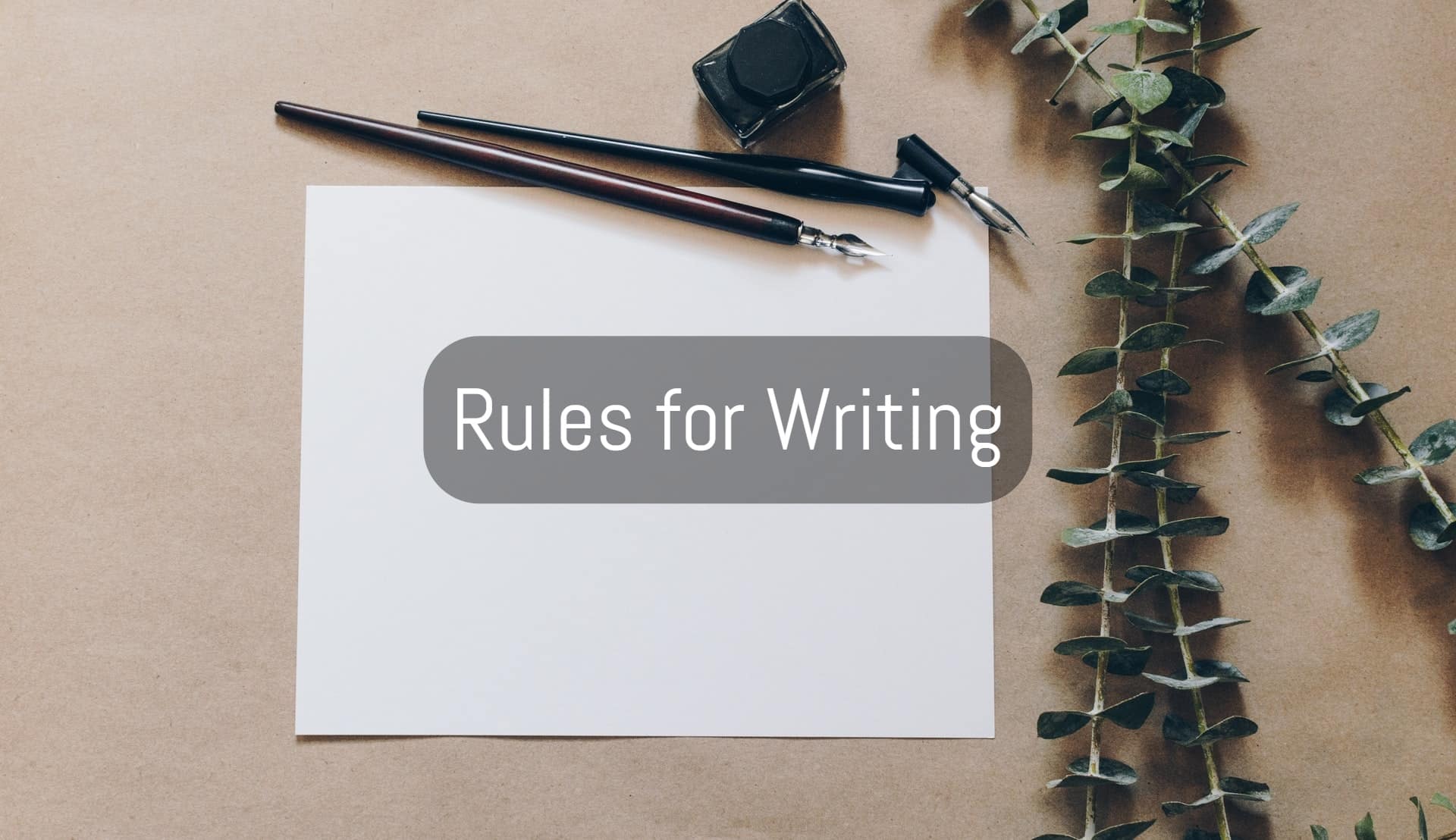Writing might seem like a chore at first, but if you knew the rules, it could be an enjoyable activity. Please read these guidelines and implement them into your writing process. With the right amount of practice, you will see tangible improvement in the quality of your essays, articles, letters, reports, etc.
Rule one: Avoid clutter
Clutter is your number-one enemy when it comes to writing. Simply put, your work is cluttered if there are many words, phrases, or sentences that take up space but do not contribute much to the progression of the ideas. Take the following example:
Boring and cluttered: The people who were watching the soccer match from the bleachers were all repeatedly shouting the name of the person who was the captain of the team.
Question: What are the ways that can help us avoid clutter?
Answer: Here are the tips to help you declutter your work:
Try to be concise all the time
Having shorter sentences contributes to better coherence. Being concise is all about giving as much information as possible using as few words as possible. Whenever you can deliver your message using one word instead of several words, always say it in one. Here is how we can transfer our boring and cluttered sentence into a better one:
Concise: The spectators were chanting the name of the team’s captain.
Important note: Being concise doesn’t mean that you should only use short sentences. It means you should use precise vocabulary items instead of long unnecessary phrases. You still need to use compound, complex, and compound-complex sentences in your writing, but you also need to be careful not to use too many unnecessary vocabulary items. This is an advanced skill that can only be perfected through practice.
Note 2: In language tests like IELTS, being concise will get you a very good cohesion and coherence score. It will also help you with your vocabulary score because concise writing requires words that deliver precise meaning.
Avoid unnecessary repetition
Repetition does not necessarily mean writing a sentence over and over again. Take, for example, the phrase basic fundamentals. “Fundamentals” means basic information. So, you don’t need the word basic. Another form of needless repetition is the repetition of ideas. When you don’t have many good ideas to include in your essay, you may just go into a bad cycle of using them over and over just to reach the word limit of your essay.
Example:
Unnecessary repetition of ideas: People should stop eating processed foods to avoid heart diseases. Eating junk food is not good for people’s hearts.
Better: People should stop eating processed foods to avoid heart diseases.
Rule Two: Be Clear and Specific
One of the things that we all hate is to read confusing texts that have no clear ideas. When a writer is not confident enough to directly express their opinion, the work will suffer. In other words, such writers try to hide behind words, and that ruins their work. Take the example below:
Weak and not clear: I think the movie The quiet Place might be considered by some a great film. John Krasinski shows the love of a father with his sacrifice at the end of the movie. Also, some people might say that Emily Blunt was the best choice for the part of a loving mother.
In the example above, the writer has not expressed his opinion confidently and clearly. The reader might get the idea that he likes the movie, but it’s just a guess. So, let’s try to fix it and make it interesting.
Specific and clear: The movie The Quiet Place is a masterpiece in terms of acting. John Krasinski glues the viewers to their seats with his moving performance throughout the entire time. The sacrifice he makes to save his children at the end of the movie is an incredible demonstration of a father’s love. As for Emily Blunt, I cannot think of anyone else more appropriate for the role of a loving mother in this movie.
Which one delivers a stronger message? Which one would you prefer to read? Be specific and try to grab the attention of your readers. That is how you can enjoy writing.
Now, let’s see what other ways we can use to make a piece of writing clear, specific, and interesting to read.
Know when to use active or passive voice
Generally, an active voice is more forceful and easier for the reader to understand; therefore, it is better for opinion essays. Passive voice, on the other hand, is useful when you don’t want to mention your personal opinion. After all, it is mainly used to hide the doer of the action. However, if you are writing an academic essay in which you need to provide facts and not personal opinions, passive voice should be your choice, but if you use it to present your opinion, you will sound insecure.
Question: But I have seen many essays that use both active and passive voice. Is it wrong?
Answer: No, it isn’t. The use of active and passive voice depends on the type of idea you want to present. A good writer always picks the right moment to use each. A rule of thumb is that if the subject of a sentence is not important and you want to put emphasis on the action, you should go for the passive voice, but if the doer of the action is important, you should use the active voice. So the next time you read a high-quality essay, focus on this and ask yourself why the writer has picked active or passive voice.
Avoid vague language
Always try to be specific. Even if your message or opinion is clear, vague language makes it boring and weak. When you write something, try to create a crystal clear picture of what you are talking about. Here are some vague words that you should avoid using:
good, bad, great, terrible, boring, nice,…
Example:
The message is clear but weak: Emma is a very good friend.
The message is clear, strong, and specific: Emma is a loyal and considerate friend.
Avoid cliché
A cliché is an idea or phrase that has been used for so long that no one pays attention to its meaning anymore. Here are some examples: happily ever after, as brave as a lion, As cool as a cucumber, pretty as a picture, etc. Such expressions do not convey a strong message anymore. So, instead of saying, “She is pretty as a picture,” try saying, “She is a gorgeous woman with a charming smile.”
Rule Three: Create the Right Tone in Your Writing
Simply put, tone refers to how you say something rather than what you say. Similarly, when you write, your words and sentence structures show your attitude and feeling toward the subject matter. Therefore, good writers always create the right tone by using appropriate vocabulary, punctuation, sentence structure, etc.
To better understand the importance of tone, take a look at the following examples:
1. The visitors have arrived at the venue. There are a lot of people now. Managing such a crowd is not easy. Each person will need assistance. I’m not sure we have enough manpower.
In this example, the writer sounds annoyed or insecure because he or she has used too many consecutive short sentences.
2. The visitors have arrived at the venue, and now there are a lot of people here, but managing such a crowd is not easy because each person will need assistance, and I’m not sure we have enough manpower.
Now the writer is frustrated because the sentence is too long and not focused at all.
3. The visitors have arrived at the venue in bulk. Managing such a crowd might not be easy since everyone may need assistance. Therefore, we must make sure we have enough manpower.
In this example, the reader sounds analytical and confident because he or she has stated a problem and shown confidence to resolve it. Moreover, the sentences are now focused. The first one states the problem, the second one explains what may happen, and the third one provides the solution.
4. Give me the book.
In this sentence, the writer is asking for the book, and no emotion is conveyed.
5. Give me the phone!
The exclamation mark indicates a strong emotion. In this case, the writer may be angry or in a hurry.
6. We cannot offer you a position because you don’t have the skills we need.
In this sentence, the employer has used a direct and impolite way to reject a candidate. This way, the candidate might get emotionally hurt.
7. Unfortunately, we do not have any suitable vacancies that match your skillset.
The same message is conveyed with words that do not hurt the reader. This is how you sound professional, polite, and confident in your writing.
Now that you understand the importance of appropriate tone in writing, you should know that a good piece of writing is always consistent in tone as well. For example, if you sound happy and optimistic in one sentence and sad or angry in the next, your writing will not be of high quality because it will confuse your reader. So, be consistent throughout your work.
Rule Four: Take Cohesion and Coherence Seriously
Talking about cohesion and coherence cannot be limited to a paragraph or two in this article; therefore, we have decided to discuss it in an article of its own. You can read that article here on this page.
Final Note: Knowing how to write well is not enough to produce high-quality work. You need to take a few more steps towards that goal:
- Read a lot of well-written essays and articles.
- Practice writing a lot and analyze your work.
- Get help from an experienced teacher or someone who writes well so that you get detailed personalized feedback and see what you have missed.
Follow us on YouTube for more tips and resources.








